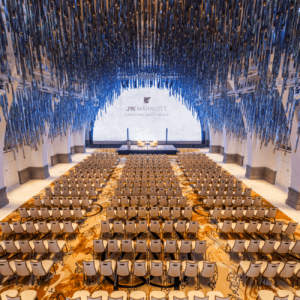 For every $1 hotels invested in programmes to reduce kitchen food waste, on average they saved $7 in operating costs.
For every $1 hotels invested in programmes to reduce kitchen food waste, on average they saved $7 in operating costs.
In a first-of-its-kind analysis for the industry, The Business Case for Reducing Food Loss and Waste: Hotels evaluated the financial cost and benefit data for 42 sites Ð including Sofitel, MGM and more Ð across 15 countries, finding that nearly every site realized a positive return on its investment to reduce food waste. Within just one year, the hotels had reduced food waste from their kitchens by 21 per cent on average, and over 70 percent had recouped their investment. ÊWithin two years, 95 per cent had recouped their investment.
The types of investments hotels made include: measuring and monitoring the amount of food wasted, training staff on new food handling and storage procedures, and redesigning menus. Nearly 90 per cent of sites were able to keep their total investment below $20,000, which was less than 1 per cent of sales on average. This shows that the cost of change was low and the benefits were high for all businesses assessed.
The 7:1 return on investment comes from buying less food and thereby reducing purchase costs, increasing revenue from new menu items developed from leftovers or foods previously considered Òscraps,Ó and lower waste management costs.
ÒWe need to take action right across the food chain if we’re going to halve food waste by 2030. That means reducing food waste in homes, farms, retail, distribution, and in the hospitality sector,Ó said Dave Lewis, Group Chief Executive of Tesco and Chair of Champions 12.3. ÒThis report clearly shows that reducing waste in hotels isn’t just the right thing to do. It also makes good business sense. So even if the moral imperative doesn’t move us, the business case for reducing food waste should persuade every CEO.Ó
ÒWith these figures, I hope more in the industry will see food waste reduction as an opportunity and an important part of the hotel business,Ó said Lionel Formento, Director of Food and Beverage, Sofitel Bangkok Sukhumvit. ÒOur customers increasingly care about the environment, and that shift shows no signs of slowing down. Sofitel Bangkok Sukhumvit has prioritized reducing food waste as an important part of our sustainability efforts. From engaging management to our chefs and suppliers, implementing a food waste reduction program has helped us stay innovative and a leader.Ó
One-third of all food produced in the world is never eaten, which has tremendous economic, social and environmental consequences. Food loss and waste are responsible for $940 billion in economic losses and 8 per cent of global greenhouse gas emissions annually. At the same time, some 800 million people do not have enough food to eat.
ÒReducing food waste within the hospitality sector provides us with a unique opportunity not only to influence an industry but to raise awareness with travellers globally. It’s exciting to see foundations, NGOs, and businesses all coming together to solve this issue and recognise food waste’s impact on our planet and biodiversity,Ó said Yolanda Kakabadse of World Wildlife Fund US’s Board of Directors.
ÒThis report, which WRAP co-authored with WRI, demonstrates the compelling economic case for reducing food waste in hotels. There is a 600 per cent return on investment, and over two-thirds of the companies find they get their money back within a year. This is excellent, but if we are to deliver the SDG 12.3 target of halving food waste by 2030, we must build momentum for change in all hotels,Ó says Marcus Gover, Chief Executive of WRAP. ÒWe have clearly shown that with simple measures, hotels can save money, protect the environment and still satisfy the needs of their customers. By working together we can make this happen more rapidly, all around the world.Ó
The report recommends hotel owners and managers take a Òtarget, measure, actÓ approach to reduce the amount of food wasted from their kitchens. It outlines five action steps for hotel managers, based on interviews with those who have implemented successful food waste reduction programmes: (1) measure the amount of food being wasted to know where to prioritise efforts, (2) engage staff, (3) re-think the buffet, (4) reduce overproduction, and (5) re-purpose excess food. By working together, businesses may also be able to share new best practices to make an even greater impact and put businesses on a trajectory to halve food waste in line with the UN’s Sustainable Development Goal Target 12.3.
ÒThe Sustainable Development Goals give us clear targets, which we need to achieve in just 13 years. We know that the worldwide food waste challenge is large and urgent. It will not be easy to solve and requires action by all of us,Ó said Liz Goodwin, Senior Fellow and Director, Food Loss and Waste at World Resources Institute. ÒThis report demonstrates that action by the hotel sector can bring results quickly and that there are real financial benefits to be realized. There is no time to waste and we need more leaders to step up and do their bit, improving their businesses and securing the economic, social and environmental benefits.Ó
For more information, read the full report at https://champions123.org/the-business-case-for-reducing-food-loss-and-waste-hotels/
This report is follow up from The Business Case for Reducing Food Loss and Waste (published March 2017) and is the first in a series of papers examining the business case for specific industry sectors. Analyses of the catering and restaurant industries will be released later in 2018.




















